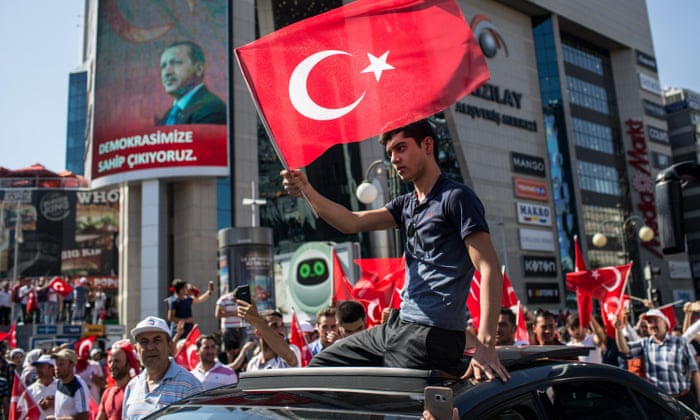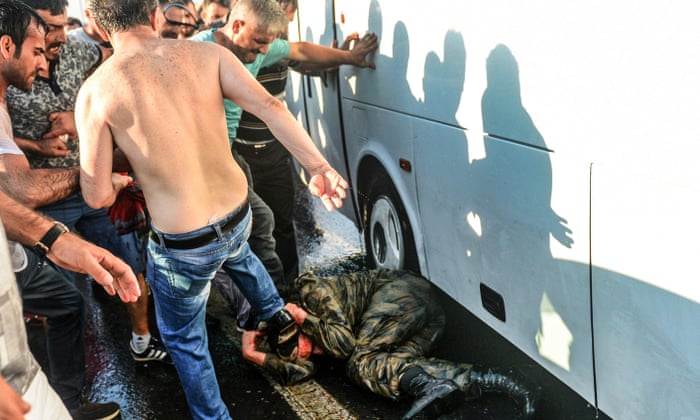Erdoğan clamps down after crushing attempted military coup
Rebel leaders could face death penalty, while more than 2,700 judges are dismissed over ‘links to plotters’
A man waves a Turkish flag from a car roof during a march in Kizilay Square, Ankara . Photograph: Chris McGrath/Getty Images


A Turkish soldier who took part in the attempted coup is kicked and beaten. Photograph: Selcuk Samiloglu/AP
Turkey’s hardline president, Recep Tayyip Erdoğan, unleashed a brutal purge of his enemies in the army and judiciary on Saturday after heading off an attempted military coup.
Erdoğan’s office put the death toll in street clashes and airborne dogfights between rebels and loyalists at 265. About 2,800 soldiers were arrested in a day of extraordinary drama that saw the putsch ruthlessly put down.
More than 2,700 judges were summarily dismissed for their alleged links to the coup’s leaders, while warrants were issued for the arrest of 140 supreme court members. The identity of the plotters remains unclear, but Erdoğan pointed the finger at Islamic scholar Fethullah Gülen who lives in exile in the United States.
In a televised speech, Erdoğan called on Barack Obama to extradite Gülen. “Mr President, I told you myself, either deport or hand over to us this person who lives in 400 acres of land in Pennsylvania,” he said. “I told you that he was engaged in coup plots but I was not listened to. Now again today after the coup I say it again.”
US secretary of state John Kerry said he fully supported the Turkish administration, but hoped Erdoğan’s government would not exacerbate the situation. “We fully anticipate that there will be questions raised about Mr Gulen,” he said. “And obviously we would invite the government of Turkey … to present us with any legitimate evidence.”
In a rare interview in the US, Gülen accused Erdoğan of staging the coup. “I don’t believe that the world believes the accusations made by President Erdoğan,” he said. “There is a possibility that it could be a staged coup and it could be meant for further accusations [against Gülen’s supporters].”
The attempted coup began on Friday night when a faction of the army seized airports, bridges, TV stations and military headquarters, before attacking the Turkish parliament, leaving the building charred and damaged.
But Erdoğan fought back after managing to send a message to supporters via a video-call with a private broadcaster, prompting thousands to wrest back state control with the help of the police and loyalists in the army.
Erdoğan’s supporters flooded the streets in the small hours of Saturday morning, swarming around the tanks and troops that seemed to have seized control of Turkey. “Turkey has a democratically elected government and president,” Erdoğan said as his supporters began to turn the tide. “We are in charge and will continue exercising our powers until the end.”
Erdoğan’s Islamist-leaning government ordered the mass arrests after 100 rebels were also killed during clashes. Erdoğan said those caught were guilty of an “act of treason” and would “pay a heavy price”. His prime minister, Binali Yildirim, later proposed changing the constitution so that the plotters could be executed.
Eight Turkish army personnel believed to be officers fled to Greece by helicopter, claiming political asylum. But the Turkish foreign minister, Mevlut Cavusoglu, said he had asked Greece to extradite the servicemen, and had been told they would be returned.
There are around 50,000 British holidaymakers in Turkey and many faced disruption when British Airways cancelled all its flights to the country. A party of 41 schoolchildren from Sutton Coldfield were stranded at Istanbul’s Atatürk airport during the coup.
The Foreign Office warned Britons to “avoid public places” in Ankara and Istanbul. Boris Johnson, the new foreign secretary, said it was “crucial that we support the democratic institutions of Turkey”. Johnson will discuss the coup at talks in Brussels on Sunday night with Federica Mogherini, high representative of the EU for foreign affairs and security policy. On Monday he will attend the EU foreign affairs council, where the agenda will be topped by Turkey, the terrorist attack in Nice and Britain’s exit from the EU.
Downing Street’s crisis response committee, COBR, or Cobra, met on Saturday night to discuss the Turkish situation. A No 10 spokesman said: “The National Security Adviser chaired a COBR meeting of senior officials this afternoon to discuss the situation in Turkey. Noting that the picture is still developing, they discussed what we know about last night’s attempted coup and the potential internal and regional repercussions.
“They considered the impact on our bilateral relationship and agreed on the importance of maintaining the close co-operation on security and counter-terrorism. … Consular staff continue to provide assistance to those affected by the airport closures. The Department for Transport are also in touch with the airlines. Officials agreed that we should monitor the situation on the ground closely over the coming days, and keep the travel advice to Turkey under review.”
Observers in Turkey feared that the day’s events would give Erdoğan the momentum to push through changes to the Turkish political system that would give him sweeping presidential powers.
Turkey’s main secular opposition parties and military high command both disowned the plotters, who claimed they were fighting for secularism. Gülen’s supporters also said they were not involved.
The moves left the international community fearing yet more instability in the Middle East. Any further unrest could change the region’s dynamic, with Turkey’s current government a key player – and previously a rare beacon of relative stability – in the Middle East. A Nato member, Turkey hosts US military bases, is a major backer of rebel factions in the Syrian civil war, and a key partner in Europe’s attempt to stop migration flows to Europe.
